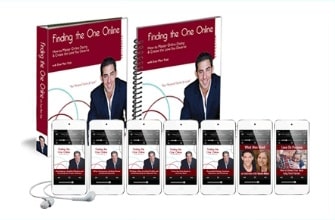How Long Does the Honeymoon Phase Last

- Dating, Marriage
The short answer? The honeymoon period lasts about six months to two years. Whether it’s a marriage or a new dating situation, there’s a honeymoon period.
This honeymoon phase is characterized by bliss, extreme idealization of your partner, and the feeling that this will never end. While being in the honeymoon stage is a lot of fun, it can’t last. Although it can be recaptured intermittently – nor should it last, if you really want to achieve a deeper, more mature connection, one you can sustain for a lifetime.
Table of Contents
The 5 Stages of Dating
Attraction
The Crash of Reality
Commitment
Intimacy
Engagement
How to Prolong It
Show Gratitude
Communicate Your Love
Spend Time (A Little Time) Apart
Schedule Dates
Have More Sex and Let Yourself Be Sexier
Live Dangerously
Keep Calm and Carry On
The 5 Stages of Dating
Whether you’re just in the early bloom of a new relationship, or you’ve been with your partner for years, you will almost always experience the same arc of progress through five stages.
Even platonic relationships go through changes like this. As long as you’re prepared for these inevitable changes and realize that they’re normal, you are armed with information that’s more likely to lead to a successful long-term commitment.
The five stages of a relationship are Attraction, Reality, Commitment, Intimacy, and Engagement. Let’s look at each of these:
1. Attraction
Our favorite, of course, is in the early stages at the very beginning, when the honeymoon phase begins as well. Your partner is fascinating, they are perfect, and even their quirks are perfect. Your heart is racing, your hands are sweaty, your stomach is full of butterflies. There’s a reason the term “lovesick” exists, and this is it.
At the same time, life is so much fun! You want them all the time, and you want to BE with them all the time. This is what researchers call “Passionate love” – characterized by the intense longing, high levels of desire, and magnetic sexual attraction of the first few months. You feel happy, euphoric, even – life is infinitely exciting.
It’s not just your imagination. Science confirms that your brain is getting flooded with feel-good chemicals during the honeymoon phase. Dopamine levels skyrocket, pumping you full of pleasurable sensations. Even when your good friends note that this just might be infatuation (which, of course, it is), you are convinced this is the love of a lifetime.
2. The Crash of Reality
Eventually, most couples begin to experience something different. You were both on your best behavior initially, and that’s slipping. How did I never notice how much he talks? Does she make that sound every time she drinks liquid? This person really can’t cook anything?
You’ve now entered the stage where the honeymoon phase ends and reality sets in, leaving many of those yummy honeymoon feelings behind. Again, biological hard-wiring is the main culprit. You’re programmed to crave variety. And contrary to popular belief, research shows us that women actually crave it more, and sooner. You’re more likely to have a decline in sexual interest as the novelty disappears. Scientists believe this is related to the prevention of inbreeding – as your partner becomes as familiar as a sibling or other relative, they become less sexually inspiring.
While this may seem like an enormous loss at first, it may not be such a bad thing. If you were as obsessive, distracted, and sexually active as you were in the early days of the honeymoon phase, you’d probably get nothing else done!
In the post-honeymoon phase, you may still love your partner profoundly, still feel lust for them, idolize them and be willing to die for them, but that’s not the same as maintaining long-term ecstatic passion.
Psychologists also note what is known as “hedonic habituation,” and it doesn’t just happen with people. At first, that new outfit, car, sound system, or even new place you’re living brings a lot of pleasure and excitement. But rather quickly, you accustom yourself to it, and it doesn’t bring the same zing it did.
While things tend to fade more quickly in your passions than people, it’s the same psychological process at play. And oddly, this habituation happens more with pleasurable experiences than with unpleasant ones.
This is the stage at which a lot of inexperienced partners may say, “Gee, I don’t have that feeling anymore. I must not be in love” It’s the second stage where many relationships fail. But if you can ride this stage out, you may be in luck.
3. Commitment
I talked about how dopamine rises in the honeymoon stage, giving you the relationship equivalent of “beer goggles”? Well, those levels fall, but interestingly, start to be replaced by oxytocin and vasopressin, the hormones that are associated with long-term attachments and comfort. This is where the rubber starts to meet the road.
True love isn’t about being blind to your partner’s flaws; it’s about seeing your partner realistically, recognizing their flaws, and still deciding that they’re the one for you. This is the phase in which you may start talking about shared dreams and goals and discussing plans for the future.
4. Intimacy
Once you’ve made someone else “the one,” true love begins. You are able to really open up to them and let your guard down. You’re not trying so hard to be perfect. You become vulnerable without holding back. You may be more privy to one another’s bodily functions or see each other ungroomed – physically or emotionally – more often.
Seeing someone’s character in a new light happens as you learn about their past and get a context for who they are. In this safe space, you are both able to work on things about yourselves and your relationship, knowing that your partner has your back, loves you unconditionally, and truly wants the best for you.
5. Engagement
This is the stage where you may finally make a pledge of lifelong commitment, formal or informal. You work to plan a happy and productive future with one another.
You are truly a team, and everything that happens, good or bad, happens in that context. There’s not so much You and I, as there is “Us.” Whatever challenges come your way, personal, as a couple, or in the greater world, it’s something you are tackling in the strength of partnership.
How to Prolong It
You may be saying, “But I really love the heady, sexy feelings of infatuation! How can I make them last?”
The good news, is that you can, up to a point. There is going to be something of a trade-off; after all, a lot of the erotic impulse has to do with the fear and anxiety connected with someone new. But what you have to remember is that while you may not have the churning gut of infatuation, you now have a safe partner with whom to explore all kinds of feelings and activities.
You can’t have 100% intensity 24/7 forever. But you can revisit it regularly if you put just a bit of work in – and it’s fun work! If you want to bump up the volume, here are some tips:
Show Gratitude
When you’ve been with someone a while, it’s easy to take them for granted. You may already know that a gratitude practice, where you focus on the things in your life for which you’re grateful, helps you to be happier and more positive. But you may not think about how that could be directed specifically at your relationship.
Take time each day to think about the positive aspects of your partner and your relationship, and let yourself feel grateful. Take it another step further, and tell your partner something positive about them each day.
Communicate Your Love
This doesn’t necessarily mean saying “I love you” all the time, although it’s certainly nice to hear once in a while. But say it in other ways. Flowers on a Wednesday, fixing that squeaky hinge, fixing their favorite dinner, coupled with “I just really appreciate you” can flood your partner, and even more surprisingly, YOU, with feelings of love. It works both ways!
Tell them something you find attractive about them, especially if it isn’t something they’ve heard a lot. Something unique to them, especially something only you might recognize, can generate surprise and the feeling of having been seen, a powerful aphrodisiac.
Expressing your love in a unique way can rekindle romance on both sides as well. Have you ever written an old-fashioned love letter? A poem or song? Drawn a picture of your partner? Something made or created by you, just for them can focus and intensify your feelings, and certainly theirs.
Spend Time (A Little Time) Apart
It’s a cliche, but it can be true: Absence can make the heart grow fonder, especially when each of you is doing something that helps you grow, feeds your (other) passions, or provides a means of self-expression.
You tend to admire your partner when they are doing something that demonstrates their competence or expertise, but also when they have the courage to try new things and improve themselves.
The added bonus is that you both get to have time to miss one another and since memory tends to be kind, to reflect on the things you love about one another.
Schedule Dates
Just because you’re together doesn’t mean you can’t keep dating. Most long-term couples recognize the importance of date nights.
If, like most of us, you’re busy and your time together becomes more about recuperating from the rest of life, it’s especially important to set aside time for just the two of you. Making it a special occasion adds another layer. Now you’re associating one another with a special, festive, dedicated time. If it gives you a chance to primp and dress up a little, even better. Your partner knows it’s for them, and that’s exciting too.
Sometimes your dates can even revisit your shared vision for the future – less formal than a recommitment ceremony, but a reminder to yourselves and each other that you’re in it to win it.
Have More Sex and Let Yourself Be Sexier
Sex isn’t everything in a relationship, but a good sex life is a great glue. We can get into ruts with our fatigue at the end of a long workday, nighttime grooming rituals, and attention to our phones.
But sex keeps you connected in many ways, especially if you’re really giving to your partner and present in the experience.
Even if you don’t necessarily start out feeling like it’s what you want to do, this is one place where fake it till you make it definitely works. If you decide to be a little sexy, there’s usually a big pay off. Just do it, you’ll be glad you did. And so will your romantic partner.
Live Dangerously
No one is suggesting that you have to take up skydiving, but research shows that shared experiences strengthen your bond with your partner. If those experiences have a little bit of risk, they’re even more powerful. For some people, that might mean singing karaoke or getting on the dance floor, for others, it’s a bike ride or hike in the mountains.
Even going to a restaurant that’s a little fancier than you’re used to can take you out of your comfort zone – together, which is the important thing. Plan surprises. Be unpredictable occasionally. When you experience something novel, you pay attention and become more engaged, just as you were in the honeymoon phase.
Keep Calm and Carry On
Remember, even the best of romantic relationships have their ups and downs. Don’t think that a rut means the end of exciting times, or that you’ll never experience the bliss of the honeymoon phase again. Getting pessimistic about the future of the relationship won’t help. Just ride it out and see how you can contribute to an infusion of positivity and romance.
Joni Mitchell recently quoted an Esquire article, “if you want endless repetition, see a lot of different people. If you want infinite variety, stay with one”. She noted, “What happens when you date is you run all your best moves and tell all your best stories — and in a way, that routine is a method for falling in love with yourself over and over. …a longtime mate knows all that old material….You learn a way of loving that’s different from the neurotic love enshrined in movies. It’s warmer and has more padding to it.”
Relationships change shape over time, get rebuilt, and evolve. While the first heated moments of the beginning honeymoon phase are of a fleeting nature, a long-term relationship, a truly lasting relationship, will revisit that exciting time again and again. It’s not the end of the honeymoon, it’s the beginning of true love.










Comments